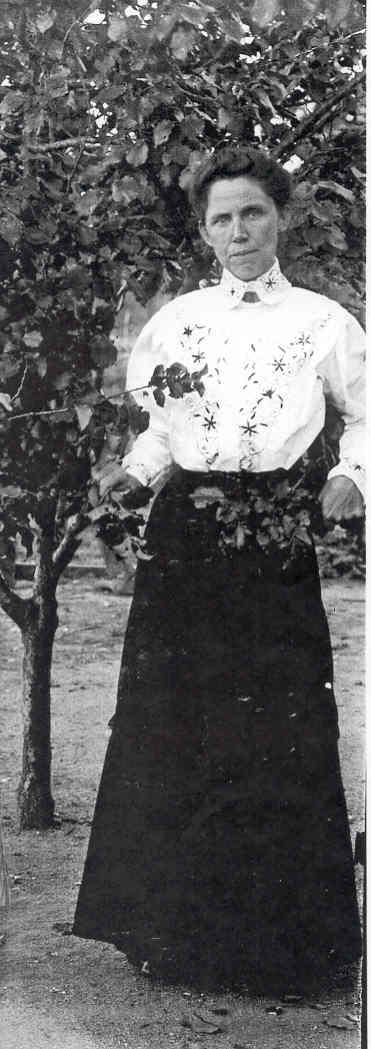Mrs. Delana Riddle
Field Worker: John F. Daugherty
Date: September 29, 1937
Interview # 8723
Address: Mill Creek, OK
Born: July 20, 1872
Place of Birth: Cass County, Texas
Father: A.J. Niblett, born in South Carolina
Mother: Susan Bregg, born in Alabama
 Delana Riddle about 1910
Delana Riddle about 1910
Father was A.J. Niblett, born in South Carolina about 1825. Mother was Susan Bregg Niblett, born in Alabama, March 21, 1840. Father was a farmer. There were five children in our family. I was born July 20, 1872, in Cass County, Texas.
Father had been living in the Territory for about three years when he wrote to my husband that this was the finest poor man's country in the world. We were living in Texas. After receiving Father's letter we decided to move here. So we did in 1894. We came in a covered wagon, crossing Red River at Gainesville. The grass was waist high everywhere. We brought a few cows and wished many times that we had more cows to graze on the tall grass. We took a lease under Louis Seeley near Troy in Tishomingo County in the Chickasaw Nation. We got our mail at Reagan at first. It came there by horseback once a week from Connerville, after being brought there from Boggy Depot.
My husband put a small stock of groceries in one room of our log house. There was no floor and we put a wagon sheet on the dirt floor until we could haul lumber from Boggy Depot to make a floor. He hauled groceries for the store from Ardmore. It took two days to make the trip and my husband was always gone one night. I was desperately afraid of the Indians and I hardly slept during the nights when my husband was away. I had heard of such terrible things the Indians had done but I later found out that I had no need to fear them. They were as civilized in the Chickasaw Nation as I. They had peculiar ways of doing things, but our methods of living were as queer to them as theirs were to us. One thing I remember was that a Chickasaw always left a green switch at his door when he left home to signify that he was gone.
My children had heard such terrible tales about the Indians that they thought of them as being wild monsters. One day my children were playing with my small sisters on a creek near Father's place. My sister heard some men coming down the creek. When she looked up and saw Indians riding toward them she began to run, saying, "The Indians are coming, Let's go to the house." One of my children looked at the approaching Indians and said, "Why, that's just men."
Our business became so good that my husband move store to Troy. This was the first store there. It was in a log house. My husband had groceries and dry goods and when he got things on hand which he couldn't sell he peddled them among the neighbors.
Not long after he established the store there was a mail line put through to Old Mill Creek, and my husband blazed the road. He made two trips a week on a horse. It was on one of these trips that he became suddenly ill and didn't live to get home. He died at the home of a settler between Troy and Old Mill Creek. This left me alone with five girls.
My husband's partner in the store and my oldest girl took care of the store. Our herd of cattle had increased to eighty. My husband had taken several head of cattle on debts at the store. It was my task to ride after the cattle. We continued to pay our $5.00 permit each year.
The first Summer after my husband's death, my youngest daughter had typhoid fever. I had to stay very close to her bedside and couldn't watch my cattle. While she was sick somebody stole ten of my finest heifers. That was all that was ever stolen from me though.
Each fall I bought enough flour to do a year and stored it on a small platform fastened to the joists.
We never locked the doors when leaving home and nobody ever entered our house while we were away or if anyone did, there was not anything missing.
I had a very difficult time making a living for my family of girls. I rented the land each year to a tenant and we tried to keep our part of the store going. Eggs were almost unsellable. Everybody had eggs and stores would hardly buy them, even at 4 cents a dozen.
My daughter was appointed postmistress at Troy when she was eighteen years old. This was a fourth class post office and she received an appointment. She was known as the youngest postmistress in the United States and received many letters of congratulations.
My parents and husband are buried at Troy. I have resided in Mill Creek for the past ten years.
Transcribed by Brenda Choate and Dennis Muncrief, February, 2001.